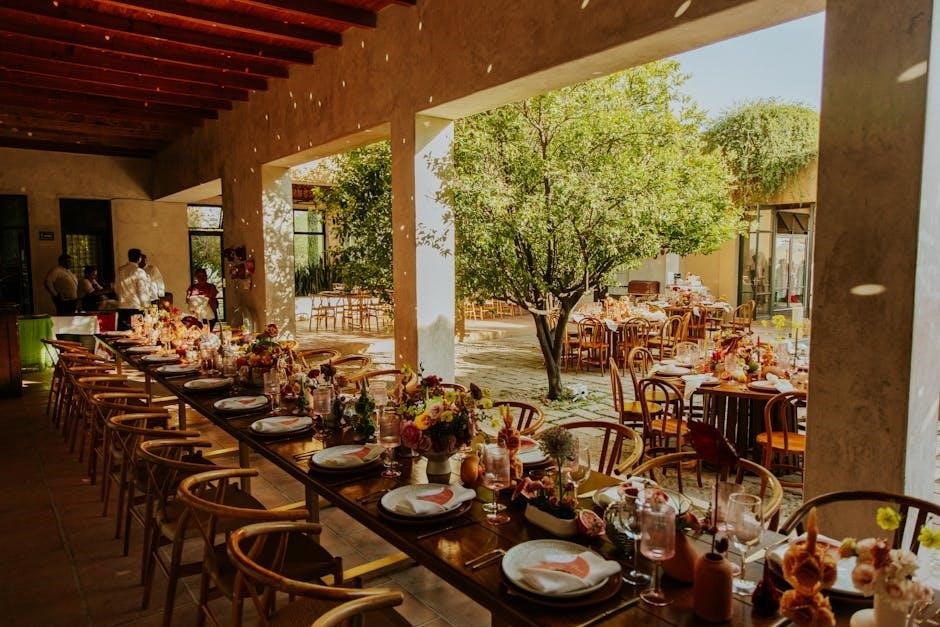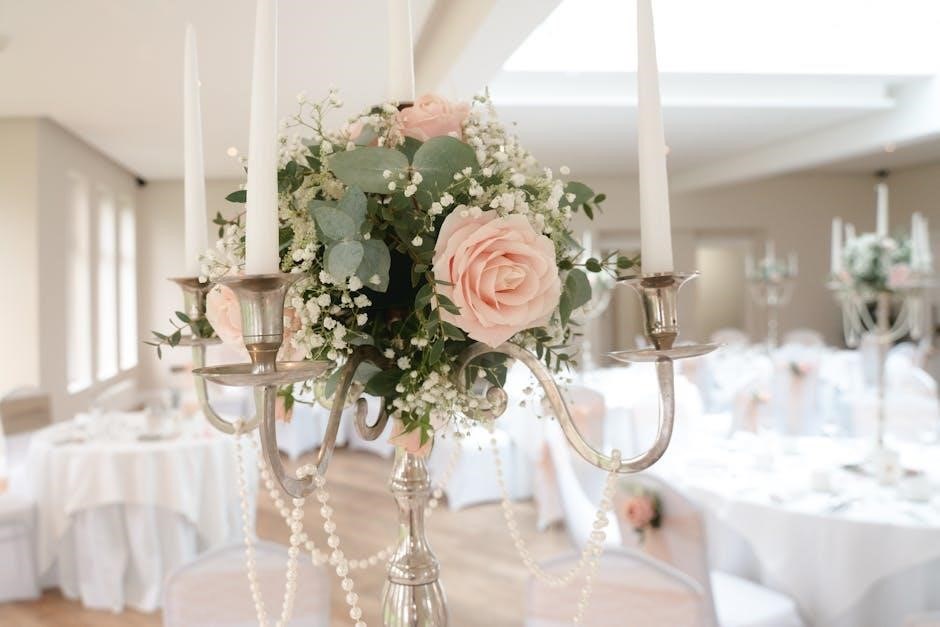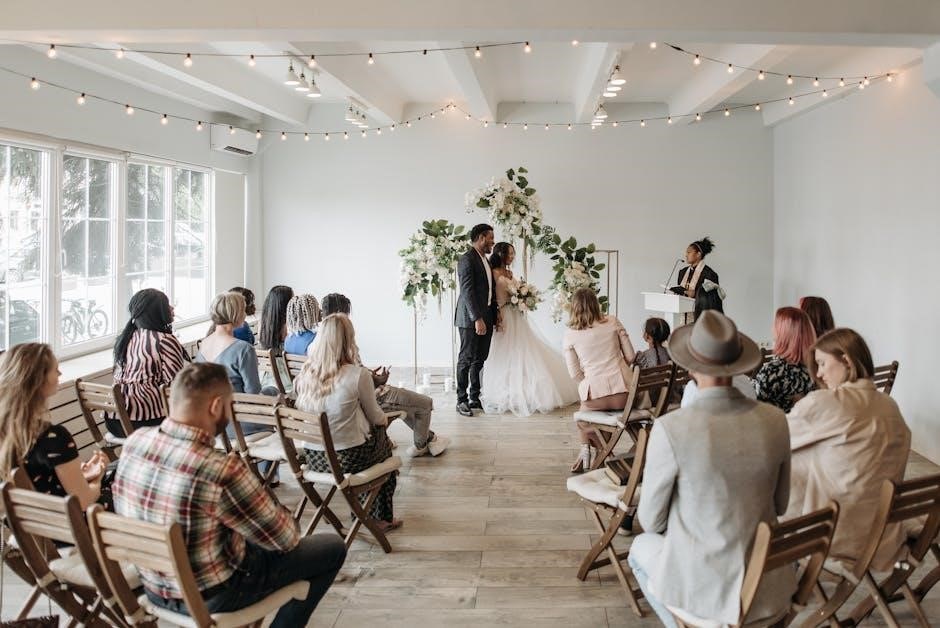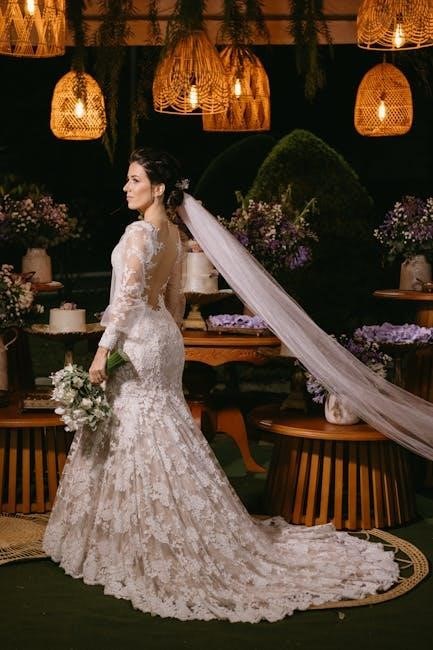
wedding planner guides
Wedding planner guides offer expert tips and strategies to streamline the planning process‚ helping couples create memorable events with ease and professionalism‚ reducing stress and enhancing enjoyment․
Overview of Wedding Planning Guides
Wedding planning guides provide comprehensive resources to help couples navigate the complexities of organizing their special day․ These guides typically include expert advice‚ step-by-step timelines‚ and practical tips for budgeting‚ venue selection‚ and vendor management․ They often cover essential topics like theme development‚ guest management‚ and décor choices‚ ensuring a seamless and stress-free experience․ By offering actionable strategies and real-life examples‚ wedding planning guides empower couples to bring their vision to life while staying organized and focused․ They serve as invaluable tools for creating a memorable and personalized celebration․
Why Hire a Wedding Planner?
Hiring a wedding planner can significantly reduce stress and ensure a seamless execution of your special day․ Planners bring professional expertise‚ ensuring every detail aligns with your vision․ They handle vendor coordination‚ budget management‚ and timelines‚ saving you time and effort․ A planner’s experience helps anticipate and resolve potential issues‚ allowing you to focus on enjoying the experience․ Their extensive network of reliable vendors and creative ideas can elevate your event․ Trusting a planner gives you peace of mind‚ knowing your wedding will be perfectly organized and memorable‚ allowing you to cherish the moment without worrying about logistics․
Setting Priorities and Budget
Setting priorities and creating a realistic budget are crucial steps in wedding planning․ Start by identifying what matters most‚ then allocate resources effectively to achieve your vision․
How to Determine Your Wedding Budget
Determining your wedding budget begins with assessing your income‚ savings‚ and contributions from others․ Discuss priorities with your partner to allocate funds to key areas like venue‚ catering‚ and photography․ Consider guest count‚ as it impacts costs․ Use budgeting tools or spreadsheets to track expenses․ Set realistic figures for each category‚ ensuring flexibility for unexpected costs․ Start early to avoid financial stress․ Remember‚ your budget should reflect your vision while staying practical․ Review and adjust as needed to ensure a balanced and memorable celebration․
Budgeting Hacks for Wedding Planning
Effective budgeting starts with prioritizing expenses and using checklists to track allocations․ Consider cost-saving strategies like off-season weddings or weekday events․ Opt for DIY decor or flowers to reduce floral costs․ Allocate funds to high-impact areas like food and photography․ Negotiate with vendors for discounts or bundled services․ Use cashback apps or rewards credit cards for purchases․ Set aside a contingency fund for unexpected expenses․ Regularly review and adjust your budget to ensure alignment with your vision and financial comfort․ These hacks help create a balanced and stress-free wedding planning experience․
Choosing the Perfect Venue
Selecting the ideal venue involves considering location‚ availability‚ guest capacity‚ aesthetics‚ and amenities․ Ensure it aligns with your theme and offers convenient parking and services․
What to Look for in a Wedding Venue
When evaluating a wedding venue‚ consider availability‚ guest capacity‚ and location․ Ensure it offers ample parking‚ restrooms‚ and necessary amenities․ Check the venue’s atmosphere to match your theme‚ whether indoor or outdoor․ Assess lighting‚ acoustics‚ and layout for comfort and flow․ Verify if it allows external vendors or has catering restrictions․ Budget-friendly options may include off-season dates or weekday events․ Visit the venue in person to gauge its condition and envision your celebration․ Ensure it aligns with your vision and logistical needs for a seamless experience․
How to Select the Ideal Location
Selecting the ideal location involves balancing convenience‚ aesthetics‚ and logistics․ Consider proximity to accommodations for out-of-town guests and ease of access for everyone․ Evaluate the setting’s ambiance to align with your wedding theme‚ whether rustic‚ urban‚ or beachside․ Ensure the location offers necessary amenities or flexibility for rentals․ Climate and seasonality are crucial—choose a date and place that complement each other․ Involve your wedding planner to scout options and negotiate details․ Visit potential locations to envision the setup and flow․ The right location sets the tone for your celebration and enhances the overall guest experience․
Creating a Wedding Timeline
A wedding timeline ensures a smooth planning process‚ outlining key milestones from engagement to the big day․ Start with a realistic 12-18 month framework‚ allowing time for vendor bookings‚ venue selection‚ and detail coordination․ Break it down into manageable phases‚ setting deadlines for decisions like guest lists‚ attire‚ and decorations․ Regular check-ins with your planner and vendors keep everything on track‚ ensuring no detail is overlooked and reducing last-minute stress․ A well-structured timeline is essential for a stress-free and enjoyable wedding experience․
Suggested Wedding Planning Timeline
A well-structured wedding timeline begins 12-18 months before the big day․ Start by setting a budget‚ choosing a date‚ and booking the venue and officiant․ Six to nine months prior‚ focus on hiring vendors‚ selecting attire‚ and finalizing the guest list․ Three months out‚ confirm details with vendors‚ send invitations‚ and plan the ceremony structure․ In the final month‚ review seating arrangements‚ prepare the wedding party‚ and conduct a rehearsal․ A detailed timeline ensures organization‚ reduces stress‚ and helps couples stay on track for a flawless celebration․
How to Build a Realistic Wedding Timeline
Creating a realistic wedding timeline involves breaking down tasks into manageable steps․ Start by prioritizing key decisions‚ such as venue selection and vendor bookings‚ within the first few months․ Allocate time for dress fittings‚ invitations‚ and RSVPs‚ ensuring each task aligns with your overall schedule․ Consider lead times for deliveries and bookings‚ and leave room for unexpected delays․ Flexibility is crucial to avoid stress․ Organize tasks by priority and deadlines‚ using checklists or digital tools to track progress․ Regularly review and adjust the timeline to ensure everything stays on course for a seamless celebration․
Wedding Party and Attire
Selecting the perfect wedding party and attire is essential for a cohesive look․ Choose attire that reflects your theme and ensures comfort for the celebration‚ while considering trends and personal style․
Choosing the Wedding Party
Choosing the wedding party involves selecting trusted friends and family to stand by your side․ Consider their availability‚ reliability‚ and ability to support you emotionally․ Experts suggest keeping the group balanced and manageable‚ ensuring roles are clearly defined․ Personalize the selection process with heartfelt invitations to make it special․ Remember‚ the size of the wedding party should align with the scale of your event․ Seek input from your partner to ensure mutual comfort and shared joy․ A well-chosen wedding party enhances the celebration and provides lasting memories․
Wedding Attire Tips and Trends
Wedding attire should reflect your personal style and the event’s theme․ Consider trends like vintage lace‚ minimalist designs‚ or bold colors while ensuring comfort․ Personalize your look with accessories or custom details․ For grooms‚ slim-fit suits and unique waistcoats are popular․ Coordinate outfits with the wedding party for a cohesive appearance․ Don’t forget to prioritize comfort and practicality‚ especially for dancing․ Accessories like statement jewelry or boutonnieres can elevate the overall aesthetic․ Research current trends and work with a stylist to create a memorable‚ timeless look that complements your venue and celebration style․

Selecting Vendors and Services
Research and compare vendors to ensure quality‚ reliability‚ and alignment with your wedding vision and budget․ Ask detailed questions to confirm their expertise and availability․
How to Choose Reliable Wedding Vendors
When selecting vendors‚ prioritize research and reviews to ensure reliability․ Ask for referrals‚ check portfolios‚ and schedule consultations to assess their expertise and communication style․ Ensure vendors align with your vision‚ budget‚ and availability․ Trust your instincts and focus on those who understand your needs․ A well-chosen vendor team will streamline your planning process‚ ensuring a seamless and stress-free wedding day experience․
Questions to Ask Potential Vendors
When evaluating vendors‚ ask about their availability‚ setup and cleanup timelines‚ and experience with events similar to yours․ Inquire about pricing‚ package details‚ and hidden fees to ensure alignment with your budget․ Discuss backup plans for unforeseen issues and verify their cancellation or refund policies․ Ensure they provide contracts outlining all agreed terms․ Additionally‚ ask for references and examples of past work to gauge their reliability and quality․ Clear communication and thorough questioning will help you select vendors who meet your expectations and contribute to a successful wedding day․

Wedding Theme and Aesthetics
Wedding themes and aesthetics set the tone‚ reflecting the couple’s style through color schemes‚ decor‚ and overall vision‚ creating a seamless and cohesive wedding experience․
Popular Wedding Themes and Ideas
Popular wedding themes range from classic elegance to rustic charm‚ offering couples a variety of styles to reflect their personalities․ Coastal‚ vintage‚ and bohemian themes are also trending‚ allowing for unique decor and aesthetics․ Couples can choose themes that align with their venue or personal preferences‚ creating a cohesive and memorable atmosphere․ Themes often dictate color schemes‚ floral arrangements‚ and overall decor‚ making it easier to plan a visually stunning event․ Choosing a theme early helps streamline decisions‚ ensuring every detail contributes to the desired ambiance and style of the wedding․
How to Choose a Color Scheme and Decor
Selecting a color scheme and decor is a crucial step in creating a cohesive wedding aesthetic․ Consider your venue‚ personal style‚ and theme when choosing colors․ Start with a base color and add complementary hues for depth․ Test colors under different lighting to ensure they look stunning day and night․ Decor should reflect your theme‚ whether modern‚ rustic‚ or vintage․ Balance statement pieces with simpler elements to avoid overwhelm․ Use flowers‚ linens‚ and lighting to enhance your color palette and create a visually stunning atmosphere that aligns with your wedding vision and style․
Managing Guest Experience
Ensuring a seamless and enjoyable experience for guests involves careful planning‚ from invitations to seating arrangements‚ to create lasting memories and a welcoming atmosphere for all attendees;
Creating a Guest List and Invitations
Creating a guest list is a critical first step in wedding planning․ Start by categorizing guests into must-have‚ should-have‚ and nice-to-have groups to help finalize numbers․ Once the list is set‚ design invitations that reflect your wedding theme‚ ensuring they include essential details like date‚ time‚ location‚ and RSVP information․ Digital invitations are a modern and efficient option‚ while traditional paper invites offer a timeless charm․ Consider sending save-the-dates well in advance for out-of-town guests․ Managing RSVPs can be streamlined with online tools‚ allowing you to track responses efficiently and plan seating arrangements accordingly․
How to Handle RSVPs and Seating Arrangements
Managing RSVPs and seating arrangements is essential for a smooth wedding experience․ Set up an online RSVP system or a wedding website to track responses efficiently․ Create a deadline for RSVPs to finalize catering and seating plans․ For seating‚ consider grouping guests by relationships or interests․ Use a seating chart to visualize table layouts‚ ensuring comfort for all‚ especially those with special needs․ Design place cards or display a seating chart to guide guests․ Prepare for last-minute changes and have ushers assist with seating․ A well-organized system ensures everyone is accommodated‚ making the event enjoyable and stress-free․

Wedding Officiant and Ceremony
Choosing the right officiant ensures a meaningful ceremony․ Research availability‚ eligibility‚ and fees․ Personalize the ceremony to reflect your style‚ whether traditional or modern‚ for a memorable experience․
How to Choose the Right Officiant
Selecting the right officiant is crucial for a meaningful ceremony․ Ensure they are legally eligible to perform weddings in your location․ Consider their availability‚ fees‚ and personal style․ Check reviews and testimonials to assess their professionalism and ability to connect with you․ Discuss your vision to ensure alignment with your wedding theme․ Whether religious‚ civil‚ or non-traditional‚ the officiant should reflect your values․ Interview potential candidates to find the best fit․ A well-chosen officiant will create a heartfelt and memorable ceremony‚ making your wedding day truly special․ Their role is pivotal in setting the tone for your celebration․
Planning the Ceremony Structure
Planning the ceremony structure involves creating a meaningful sequence of events that reflect your personal style and values․ Start with the processional‚ followed by welcoming remarks‚ readings‚ and vows․ Include personal touches like special rituals or music to make it unique․ Ensure the ceremony flows smoothly by timing each segment․ Balance tradition with creativity to honor your heritage while expressing your individuality․ Coordinate with your officiant to outline the order of events and rehearse beforehand for a polished execution․ A well-planned ceremony ensures a heartfelt and memorable experience for both you and your guests․
Wedding Music and Entertainment
Wedding music and entertainment are key elements that set the tone for your celebration․ They enhance the atmosphere‚ create memorable moments‚ and keep guests engaged throughout․ Proper planning ensures seamless execution‚ making your wedding unforgettable․
Selecting the Perfect Wedding Music
Selecting the perfect wedding music is crucial for setting the tone of your celebration․ Consider your personal style‚ venue‚ and guest demographics when choosing your playlist․ Start by deciding on music for key moments like the ceremony‚ first dance‚ and reception․ Hire a professional DJ or live band to ensure smooth transitions and high-energy entertainment․ Personalize your playlist with meaningful songs that reflect your journey as a couple․ Don’t forget to include crowd-pleasers to keep guests engaged․ With careful planning‚ your wedding music will create unforgettable memories and keep the celebration lively from start to finish․
How to Choose Entertainment for the Reception
Choosing entertainment for your reception is key to keeping guests engaged and creating a lively atmosphere․ Consider your audience’s preferences and the venue’s space constraints․ Options include live bands‚ DJs‚ or unique performers like magicians․ Ensure the entertainment aligns with your wedding’s style and budget․ Check reviews and request demos to gauge their performance quality․ Involve guests by incorporating activities like dance-offs or photo booths․ Coordinate with your planner to ensure smooth transitions between speeches‚ toasts‚ and performances․ The right entertainment will keep the energy high and leave a lasting impression on your special day․

Wedding Photography and Videography
Wedding photography and videography capture lifelong memories․ Ensure styles match your vision‚ budget‚ and vendor reliability for stunning‚ professional results that reflect your unique love story․
Tips for Choosing a Wedding Photographer
When selecting a wedding photographer‚ prioritize style and portfolio alignment with your vision․ Ensure their experience matches your venue and theme․ Compare budgets and packages‚ focusing on quality and reliability․ Check reviews and testimonials to assess professionalism and creativity․ Schedule consultations to gauge personal connection and communication skills․ Discuss your expectations clearly to ensure they capture your unique story․ Finally‚ review contract details to confirm deliverables and timelines‚ ensuring your memories are preserved beautifully and professionally․
How to Select a Videographer
Selecting a videographer involves reviewing portfolios to ensure their style aligns with your wedding vision․ Look for consistency in lighting‚ editing‚ and storytelling․ Request full wedding examples to assess their ability to capture key moments․ Discuss your expectations‚ such as coverage duration and drone usage‚ to ensure alignment․ Check reviews and testimonials for professionalism and reliability․ Compare packages and budgets‚ ensuring the final product meets your quality standards․ Ask about equipment and audio capabilities to guarantee crisp visuals and clear sound․ Finally‚ ensure their contract details are clear‚ including delivery timelines and final product formats․

Wedding Day Coordination
Wedding day coordination ensures a seamless execution of plans‚ managing timelines‚ vendor deliveries‚ and setups while maintaining open communication with the couple and wedding party for a stress-free experience․
How to Coordinate the Wedding Day
Coordinating the wedding day involves meticulous planning to ensure every detail unfolds smoothly․ Start by finalizing the timeline‚ confirming vendor deliveries‚ and setting up decorations․ Assign a trusted point person to handle last-minute issues‚ allowing the couple to relax․ Conduct a final walkthrough with the venue and vendors to verify arrangements․ On the day‚ maintain open communication with the wedding party and vendors to address any unexpected challenges․ Have a backup plan for unpredictable factors like weather․ By staying organized and proactive‚ you can create a seamless and stress-free experience‚ allowing the couple to enjoy their special day fully․
Creating a Wedding Day Checklist
A wedding day checklist is essential for ensuring every detail is perfectly executed․ Start by listing all vendors‚ their arrival times‚ and setup requirements․ Include the ceremony order‚ speech schedule‚ and reception layout․ Don’t forget smaller items like decorations‚ candles‚ and emergency kits․ Prioritize tasks based on importance and timing‚ and share the checklist with your wedding party and vendors․ Assign a trusted person to oversee the list and handle any last-minute adjustments․ Finally‚ review everything the night before to confirm all elements are in place‚ ensuring a seamless and stress-free celebration․
Final Preparations and Wrap-Up
Ensure all final details are confirmed‚ from vendor deliveries to seating arrangements․ Prepare thank-you notes and distribute them promptly after the wedding to express gratitude to guests and vendors․
Final Checks Before the Wedding
Conduct a thorough review of all wedding details‚ confirming vendor deliveries‚ seating arrangements‚ and timelines․ Ensure the wedding party is aware of their roles and rehearsal schedules․ Check that all legal documents‚ such as the marriage license‚ are complete․ Review the RSVP list and finalize the seating chart․ Prepare an emergency kit with essentials like bobby pins‚ tissues‚ and safety pins․ Confirm the setup and layout with the venue and vendors․ Review the wedding day checklist to ensure nothing is overlooked․ Make sure all payments are settled and thank-you notes are ready for distribution after the event․
How to Send Thank-You Notes and Wrap Up
Sending thank-you notes is a heartfelt way to express gratitude to guests‚ vendors‚ and your wedding party․ Personalize each note‚ mentioning specific gestures or memories․ Include a photo from the wedding for a memorable touch․ Use a checklist to ensure no one is overlooked․ Delegate tasks‚ like having your partner or maid of honor help write notes‚ to save time․ Aim to send them within three months post-wedding․ Finally‚ wrap up by confirming all payments‚ collecting items from the venue‚ and sharing a final thank-you message on social media to celebrate your special day․